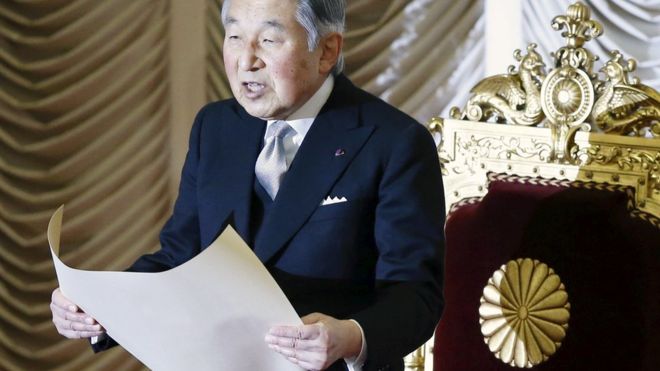Japan's Emperor Akihito has said he fears age and deteriorating health mean he is finding it difficult to continue in his role.
The revered 82-year-old emperor's comments came in his second-ever televised address to the public.
While he did not use the word "abdicate", he strongly indicated that he wishes to hand over his duties.
PM Shinzo Abe said the government would take the remarks "seriously" and discuss what can be done.
In 10-minute pre-recorded message, Emperor Akihito said he hoped the duties of the emperor as a symbol of the state could continue steadily without any breaks.
Akihito, who has had heart surgery and was treated for prostate cancer, has been on the throne in Japan since the death of his father, Hirohito, in 1989.
If he were to abdicate, it would be the first time a Japanese emperor has stepped down since Emperor Kokaku in 1817.
Akihito's address to Japan
"While, being in the position of the emperor, I must refrain from making any specific comments on the existing imperial system, I would like to tell you what I, as an individual, have been thinking about.
Ever since my accession to the throne, I have carried out the acts of the emperor in matters of state, and at the same time I have spent my days searching for and contemplating on what is the desirable role of the emperor, who is designated to be the symbol of the state by the constitution of Japan. As one who has inherited a long tradition, I have always felt a deep sense of responsibility to protect this tradition.
At the same time, in a nation and in a world which are constantly changing, I have continued to think to this day about how the Japanese imperial family can put its traditions to good use in the present age and be an active and inherent part of society, responding to the expectations of the people."
Emperor Akihito said one possibility when an emperor could not fulfil his duties because of age or illness was that a regency could be established.
But he suggested this was not the ideal outcome, saying: "I think it is not possible to continue reducing perpetually the emperor's acts in matters of state and his duties as the symbol of the state."
Akihito's eldest son, 56-year-old Crown Prince Naruhito is first in line to the Chrysanthemum throne, followed by his younger brother Prince Akishino. Women are not allowed to inherit the throne and so Princess Aiko, the daughter of Crown Prince Naruhito, cannot succeed her father.
Why can't the emperor abdicate?
Abdication is not mentioned under existing laws, so they would need to be changed for the emperor to be able to stand down. The changes will also have to be approved by parliament.
The emperor is constitutionally not allowed to make any political statements, and the desire to abdicate could be seen as being political.
What has the reaction been?
The public seems to support the emperor's desire to abdicate, with the younger generation in particular saying he should be allowed to relax in his old age.
A recent survey by the Kyodo news agency found more than 85% saying abdication should be legalised.
But the move is opposed by some more conservative sections of society.
Is this the first time a revision of the law has been discussed?
A debate about whether or not a woman would be able to ascend the throne was discussed in 2006 when the emperor had no grandsons, but was postponed after a boy was born to a family.
Prince Akishino also called for a debate on whether a retirement age should be set for the Emperor in 2011, but it did not result in a law change.





